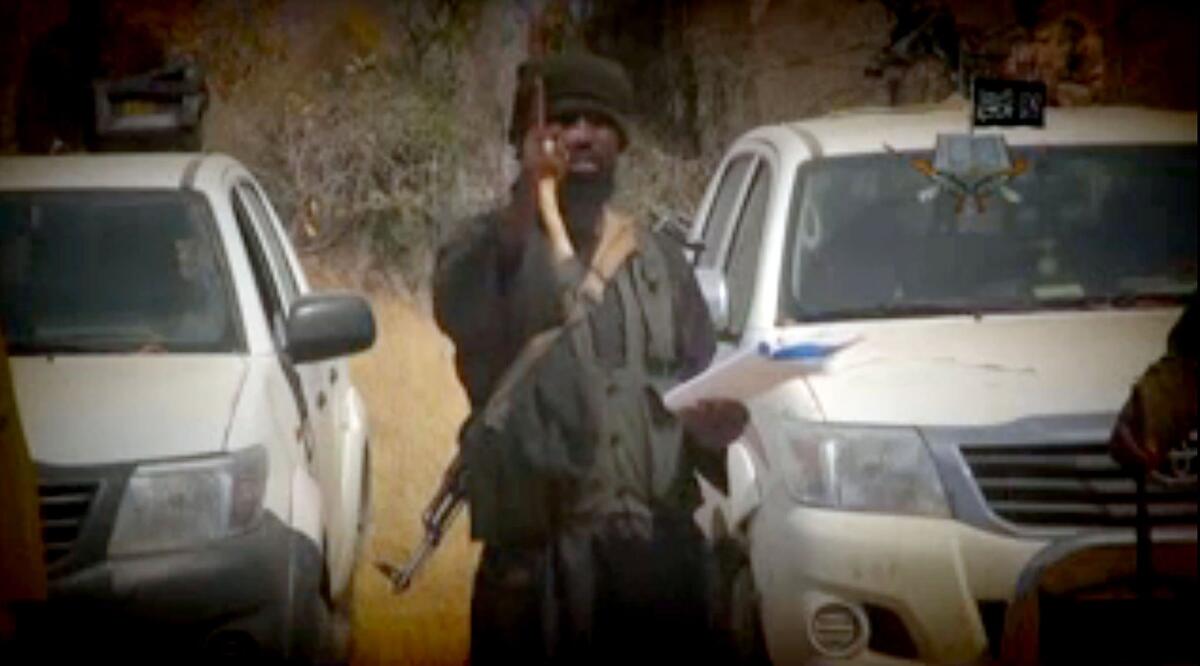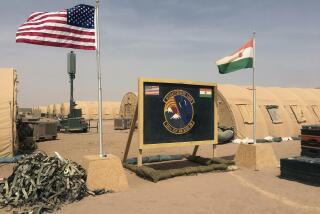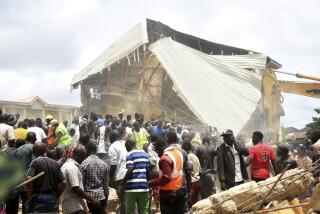Boko Haram’s pledge seen as propaganda coup for Islamic State

The decision by the Nigerian extremist group Boko Haram to pledge allegiance to Islamic State amounts to a significant propaganda coup for the Syrian-based organization, analysts say, and raises questions about whether the Nigerian militants could morph into a more global threat.
Boko Haram’s leader, Abubakar Shekau, released a video Saturday with an audio recording of the loyalty pledge, mirroring those made by groups in Afghanistan, Libya, Egypt and Algeria.
Shekau’s organization, which has waged a relentless terror campaign in northern Nigeria, is the largest group to pledge to obey Islamic State. “We announce our allegiance to the caliph of the Muslims ... and will hear and obey in times of difficulty and prosperity, in hardship and ease, and to endure being discriminated against,” the oath says.
Saying that God did not want Muslims to be divided, Shekau called on other Muslims to join under the Islamic State banner.
Boko Haram and Islamic State employ similar forms of extreme violence against their enemies. The Nigerian group has long been beheading prisoners, including police, soldiers, civilian fighters and those it accuses of spying, including women.
It has attacked schools, cutting the throats of schoolboys and firebombing dormitories after locking students inside. The group abducted nearly 300 schoolgirls last April; Shekau later said they had been sold in the market as slaves. It has often used children, including girls, to launch suicide bomb attacks, and has attacked villages by having its fighters arrive disguised as Nigerian soldiers, before yelling “God is Great,” and opening fire, randomly killing dozens or hundreds of people in a single attack.
If the oath is accepted by Islamic State and formalized, Boko Haram could expect military support, according to analysts.
What’s not clear is the extent to which Boko Haram – whose insurgency has been largely a local fight against the Nigerian state – might begin to attack Western targets in Nigeria.
In 2011, Boko Haram attacked the Abuja-based U.N. headquarters in Nigeria, killing at least 18 people. Last year, it launched a failed suicide bomb effort in the commercial hub of Lagos. But overwhelmingly its attacks have killed and wounded ordinary civilians, including many Muslims, in markets, village squares and transport hubs, mainly in the country’s north. Before Shekau took over the group in 2009, its targets were the Nigerian government, military, police and politicians.
Boko Haram’s attempt to set up an Islamic state in northern Nigeria appears to be failing, in a sign the group may have overreached militarily. It has lost control of scores of towns and villages in recent weeks, pounded by a 10,000-strong regional force, including the armies of Chad, Niger and Cameroon alongside Nigeria.
Daveed Gartenstein-Ross, a senior fellow with a Washington-based counter-terrorism institute, the Foundation for the Defense of Democracies, said Islamic State needs to create a perception of constant expansion so it can attract the recruits it needs to replace fighters on its many battlefronts in Syria and Iraq.
“As I’ve noted, IS has a deeply flawed business model. Since it is at war on all sides, it needs to constantly replenish its ranks,” he wrote in a series of tweets reacting to the Boko Haram announcement.
”To continue to draw zealous recruits, IS needs to maintain the perception of momentum. It has lost that in Iraq/Syria, with losses mounting. Hence, IS’s attempts to show momentum have shifted from Iraq and the Levant to international expansion. Boko Haram is a big prize in that regard,” he wrote.
Twitter posts purportedly by Islamic State supporters suggest that they welcome the Boko Haram pledge. In one tweet posted Sunday, an Islamic State figure is pictured drinking from a coconut to celebrate the news.
“This #IslamicState Mujahid is cracking a Coconut on hearing the ... news of #BokoHaram enjoying the sweet milk,” the tweet said, referring to the loyalty pledge.
Boko Haram has thousands of fighters who until recently were camped out in bases in the Sambisa Forest in northeastern Nigeria. But Nigerian and regional military forces claim to have killed hundreds in recent attacks. The president of Chad, Idriss Deby, said last week that his country’s military knew where Shekau was and that he would be killed if he didn’t surrender.
The pledge by Boko Haram comes as a battle for the loyalty of jihadi groups unfolds between Islamic State and Al Qaeda. In the past, Boko Haram’s links were mainly to the Al Qaeda affiliate in western and northern Africa, Al Qaeda in the Islamic Maghreb. There were also reports of direct contact between Boko Haram and Al Qaeda.
Boko Haram’s latest threat is to launch attacks during Nigeria’s election later this month, which may deter voters from lining up for hours to cast their ballots, given the difficulties authorities face in guaranteeing security.
Boko Haram opposes democracy, secular education and other elements of Nigeria’s modern secular state. The country of 170 million is divided between Muslims, concentrated in the impoverished, neglected north of the country, and the mainly Christian south.
Nigerian soldiers and civilian forces have likewise been accused of atrocities against terror suspects by rights groups including Amnesty International and Human Rights Watch.
Follow @RobynDixon_LAT for news from Africa
More to Read
Sign up for Essential California
The most important California stories and recommendations in your inbox every morning.
You may occasionally receive promotional content from the Los Angeles Times.










